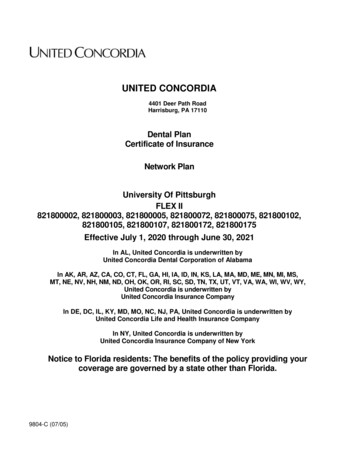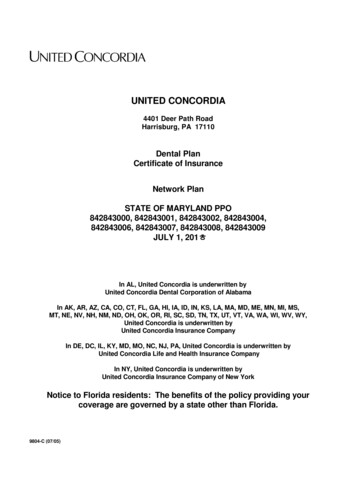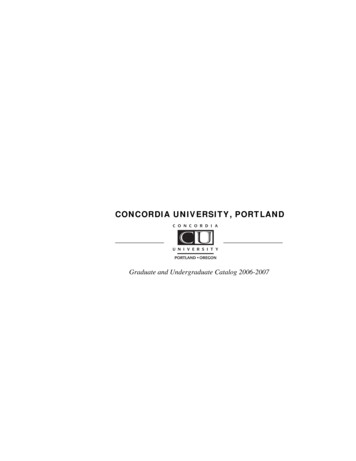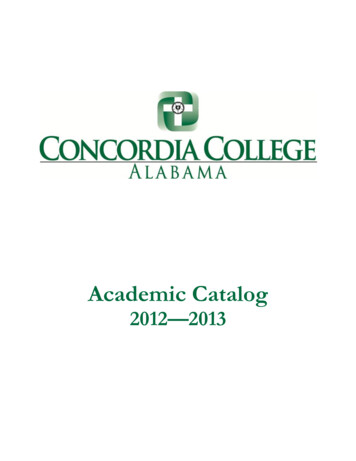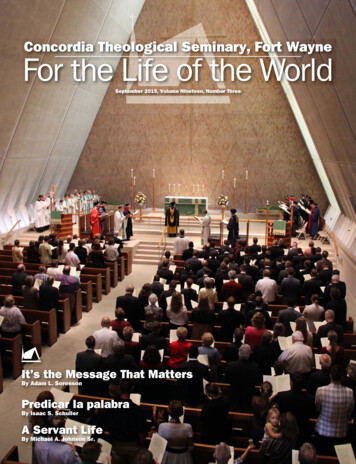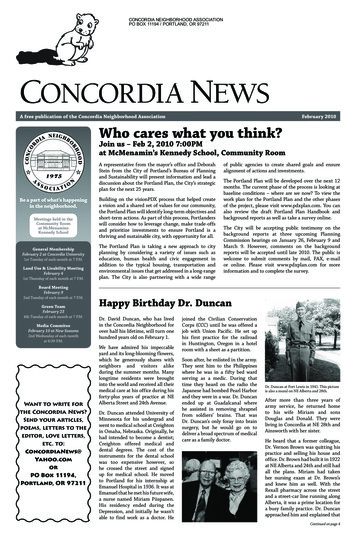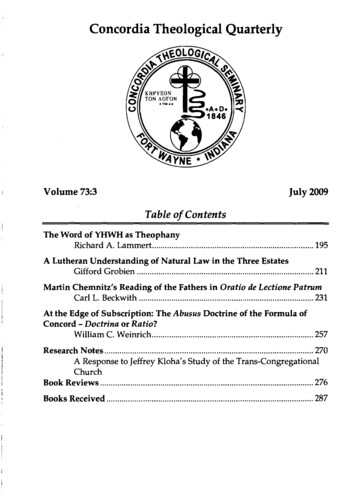
Transcription
Concordia Theological QuarterlyJuly 2009Volume 73:3Table o f ContentsThe Word of YHWH as TheophanyRichard A. Lammert. 195A Lutheran Understanding of Natural Law in the Three EstatesGifford Grobien . 211Martin Chemnitz's Reading of the Fathers in Oratio de Lectione PatmmCarl L. Beckwith . 231At the Edge of Subscription: The Abusus Doctrine of the Formula ofConcord - Doctrina or Ratio?William C. Weinrich. 257Research Notes . 270A Response to Jeffrey Kloha's Study of the Trans-CongregationalChurchBook Reviews . 276Books Received . 287
The Word of YHWH as TheophanyRichard A. LammertMost interpreters of the New Testament affirm that there are at least afew texts where "the Word" (b k6yos) is a personal being, the Son of God(John 1:1, 14; Heb 4:12; Rev 19:13). The most widely recognized of thesetexts, the prologue of John, identifies the eternal Son as "the Word" whocreated all things (1:l-3) and "became f l e s h (1:14) as Jesus, the incarnateSon. Many interpreters of the Old Testament, however, understand a verysimilar expression in the Old Testament, "the word of YHWH" (;n;l9 12t),as signifying merely a verbal word, spoken by God and heard by theprophet to whom "the word of YHWH came."' The evident linguisticconnection between the two terms is not readily extended to a theologicalconnection. A close exegetical consideration shows, however, that theconnection between the two is also theological: the word of YHWH is atheophany in several Old Testament texts.I. The Word of YHWH as Divine HypostasisIn the worldview of the Old Testament, divine attributes that areidentified with God and yet exhibit some degree of independent identityoften called hypostases-play a much more prominent role than we in theWestern world are accustomed to seeing. Charles Gieschen contrasts ourtypical (Western) way of viewing attributes, such as Word, as abstractconcepts with the biblical (Eastern) way of viewing these attributes astangible forms:It has been affirmed through textual analysis that it is valid to speak ofhypostases as aspects of God that have degrees of distinct personhood. Itshould be emphasized that our modern ways of conceptualization oftenresist giving a degree of personhood to these divine attributes or aspects.In spite of this, the textual evidence leads us to understand a world viewthat is based much more on tangible forms than abstract concepts. Thus,Name, Glory, Wisdom, Word, Spirit, and Power are not primarily abstractI E.g., Jer 1:2,4. The four-letter personal name of God in thc Old Testament, ?;IT,istransliterated as YHWH in this study rather than "Yahweh" or translating it with thetitle "the LORD" as in most English translations. The fact that the title "the word ofYHWH" contains the divine name is significant: it links these visible manifestations toYHWH himself. Where his name is, there he is (e.g., Deut 12:5).Ricllard A. Lammert is Technical Services Librarian and a n adjunct instructor ofHebrew at Concordia Theological Seminary, Fort Wayne, Indiana.
Concordia Theological Quarterly 73 (2009)concepts in this world view; they are realities with visible forms. 1Gieschen's summary of his textual analysis serves as a base from which toview the exegetical evidence impelling us to understand several of the ic oniof Y H W H accounts in the Old Testament as actual theophanies, orappearances of God in visible form.The major contribution to the study of the Word of God in the OldTestament is the work of Oskar Grether, Nmnv rrnd Wort Gottes i r r AltetrTestnment.3 Despite having Narne first in the title, the majority of the workfocuses on the Word of God. Grether states the basis for his investigation inthe foreword: "In the following work, Name and Word of God in the OldTestament will be investigated in their relation to revelation."' Grether'spoint of departure appears to be conducive to understanding the word ofYHWH as a theophany. Unfortunately, Grether exhibits the tendency ofviewing the word of YHWH more as an abstract concept than as apersonal being. In the following analysis, Grether's view represents oneend of the spectrum of views on the word of YHWH as theophany, whileGieschen represents the other.Grether collects all the word o f YHWH (and related) phrases in theOld Testament, categorizing and examining them.5 H e shows that the vastmajority of the occurrences of the phrase occur in the prophetic literature.The few occurrences in the Torah are almost exclusively a reference to thecovenantal word of God in the Ten Commandments. In the propheticliterature, however, the word of YHWH refers to what Grether calls the"prophetic Word of God." After his investigation of the word of YHWH inthe Old Testament, Grether observes the following about tlw word as a nhypostasis:The hypostasization of the 131 [word] concept reaches its fullestdevelopment in the postcanonical time, that is, after the boundaries of thepresent work. Places such as Wis. 1R:14 ff., where the Logos appears as apersonality with a large measure of independence in order to kill theCharles A. Gieschen, Anxelo norpl icCl ristokyy:Anleccdents and Early E idence,Arbeiten zur Geschichte des antiken Judentums und des Urchristentums 42 (Leiden;Boston: Brill, 1998), 122. For a defense of hypostasis nomenclature, see 36-45.3 Oskar Grether, Nantc und Worl Gottcs in, Alten Testament, Beiheft zur Zeitschriftfurdie alttestarnentliche Wissenschaft 64 (GieDen: A. Tbpelmann, 1934).This was Grether'sHnbilitationsschrft, presented at the Universitat Erlangen in 1933.'Grether, Name und Wort, v. All translations of the German are mine.All of the phrases that Grether examines are of the form 121 in the construct caseplus mny,u-nht, and similar words. 111in the absolute case has too wide a range ofmeanings (including"word," "thing," "event," "history") to provide any specificity.
Lammert: The Word of YHWH as Theophany197firstborn of the Egyptians, is riot ytJt found in the canon of the Old'Testament. Nevertheless, the beginnings of hypostasization lie in it.6It is this last statement of Grether's that we will investigate in detail. Is itonly the beginnings of hypostasization of the Word that are to be found inthe Old Testament, or is there already an hypostasization of the Word, withthe word of YHWH appearing as a theophany in Old Testament texts?It is difficult to answer this question. Grether admits that the decisionis often more or less subjective.7 Granted that the decision is oftensubjective, one must consider upon what basis to make that judgment.Quoting G. Westphal, Grether himself gives us a basis upon which to makethat judgment:It is in any case a conspicuously fine distinction to notice in the use of thephrases 17'5 5 717- 1 x 1 l7ll [and the word of YHWH canie to Elijah](1 Kings 17:2, 8; 18:l; 21:17, 28), as long as Elijah is distant from Horeb,and ;n7' 1 [and YHWH said], as long as Elijah is on Horeb andpersonally communes with Yahweh here (1 Kings 19:15). Thereby thevoice that Elijah hears (v. 13) is designated as Yahweh's voice. One mayconclude from this, that a deliberate distinction should be made herebetween mediate and ininiediate speaking with God. The Word, just asthe Name, plays n rnucll morc itrdepcndent rolr i n ancient times than we canfcel-we find ourselves here already on the way to a personification of theWord.8Here Grether sounds surprisingly close to Gieschen. Since "the Word . . .plays a much more independent role in ancient times than we can feel,"then we should be open-as faithful interpreters-to the possibility thatword of YHWH is a title for YHWH's visible appearance or form. We musttake into account that it is more difficult for us moderns than for theancient Israelites to see a given account as a theophany.11. An Examination of Word of YHWH TextsBefore we apply Westphal's axiom to Grether's analysis, we shouldnote Westphal's own analysis of the Elijah pericopes. Westphal hasconcluded that there is a distinction between the "mediate" and the"immediate" speaking of God. In doing so, however, he is making adistinction that cannot be made exegetically. The biblical text stresses that(sinful) humans cannot see God and live: "Then Moses said, 'Now showme your glory.' And the LORD said, 'I will cause all my goodness to passGrether, N R I I I Cllr dWort, 150; (italics mine).Nante ltrtd Wort, 150-151.8 Grether, Nizmt, lirld Wort, 151; (italics mine).7 Grether,
198Concordia Theological Quarterly 73 (2009)in front of you. . . . But,' he said, 'you cannot see my face, for no one maysee me and live"' (Exod 33:18-20). The knowledge among the Israelitesthat no one may see God and live is underscored by the incidents where anindividual saw a person who was God, and marveled that he lived.Additionally, Deuteronomy ends by noting, "Since then [the time ofMoses], no prophet has risen in Israel like Moses, whom the LORD knewface to face" (Deut 34:lO). If no one other than Moses warranted face-toface communication-and even that must have been mediated, sinceMoses himself could not see God and live- then no prophet can claim tohave an "immediate" communication from God. Because one cannotunderstand exegetically any communication to be immediately from God,the distinction that Westphal has found in the text evaporates. Since thefall, God always mediates his presence to sinful humans.In addition, upon closer examination, one sees that Westphal has beensomewhat selective in his presentation of the textual evidence. He correctlynotes that l;r? u 5 777. 7a-r l;r l(and the word of YHWH came to Elijah)is used when Elijah is distant from Horeb, and 717' i (and YHWHsaid) when he is on Horeb. However, he does not mention one otherappearance of YHWH in the pericope:Elijah was afraid and ran for his life. When he came to Beersheba in Judah,he left his servant there, while he himself went a day's journey into thedesert. . . . All at once an angel ( 7 5 5 touched)him and said, "Get u p andeat.". . . The angel of the LORD ( 7 1 7 755n) came back a second time andtouched him and said, "Get up and eat, for the journey is too much foryou." (1 Kings 19:3, 5, 7)If the word of YHWH and YHWH represent two different types ofmediation, then the angel of YHWH would seem to represent a third type. Itis better, however, to understand these variations as different titles for thesame mediation, not as different types of mediation. Furthermore, the angelof YHWH is understood as a theophany elsewhere in the Old Testament."Westphal has ignored an important piece of textual evidence. As soonas Elijah reaches Mount Horeb, the text continues:There he went into a cave and spent the night. And the word of the LORDcame to him (17) 717'1g7 i1271): "What are you doing here, Elijah?" Hereplied, "I have been very zealous for the LORD God Almighty. . . ." Hesaid, "Go out and stand on the mountain in the presence of the LORD(717 ?!q&), for the LORD (7177 7 71)is about to pass by." (1Kings 19:9-10)9 See, forexample, Gieschen, Angelomorphic Christology, 51-69.
Lammert: The Word of YHWH as Theophany199The word of YHWH speaks to Elijah not only when he is distant fromMount Horeb, but also when he is o n Mount Horeb. There is n o finedistinction (puce Westphal) between the phrases used for the t w o differentlocations. The only distinction that appears in the text is between "thew o r d of YHWH" a n d "YHWH." Both of them speak a s YHWH; yet "thew o r d of YHWH" tells Elijah that "YHWH" will pass by Elijah.10Based upon the distinction between the t w o phrases that Westphalmade, Grether applies that insight to a text from the Torah:One could just as well [as the Elijah pericope] refer to the jahwistic reportof the making of the covenant with Abraham (Cen. 15:l ff.). At first (v. 1and 4) it is the 127 [word] that mediates the interaction of Yahweh withAbraham. In verse 9, which orders the preparations for making thecovenant, it says, "Then He spoke to him." Now Yahweh is thought of asnearer than before. Also indicative is the fact that in the history of thepatriarchs only twice an expression composed with 127 is used for thespeaking of Cod, otherwise however the verb i n ? [to say] is used.Undoubtedly the expression "and the ?I? 127 [word of YHWH] came"stresses the distance between the speaker and the one spoken to morethan "and He spoke" and perhaps occasionally an intention ruled in thechoice of the expression. Rut that is by no means regularly so.llUsing Westphal's distinction, Grether arrives at a false dichotomy. Thecontext hardly allows o n e to say that YHWH is nearer in Gen 15:9 (whereYHWH himself speaks) than in Gen 15:4 (where the word of YHWHspeaks). In Gen 15:5, the word of YHWH takes Abram outside; such amanifestation must be "near" Abram.From the same pericope, Gieschen concludes that this is a n account ofa theophany:The phenomenon described seems to begin with a vision (15.1), thenprogresses to a manifestation that comes to Abram in order to speak andlead him outside to see the stars (15.4-6), then concludes with the smokingfire pot and flaming torch going between the sacrifices that Abramprepared (15.7-21). There is good reason to compare this theophany tothose involving the Angel of YHWH in subsequent portions of the OT.Thus, the Word of YHWH could be considered to be an angelomorphicfigure, especially by later interpreters in the first century CE.12The biblical text itself provides support for Gieschen's conclusion that the'0l2See the discussion of this pericope by Cieschen, Angelomorphic Qlristology, 105.Grether, Narnr und Wort, 151.Gieschen, Angrlomorphic Christolom, 103-104.
200Concordia Theological Quarterly 73 (2009)word of YHWH in this text is a theophany:After this, the word of the LORD came to Abram in a vision (?!no?. P?11(' 5 ;ri;r9-igt ;r:?): . . . Then the word of the LORD came to him' (inn?m;r9-ig? ;r?;11): "This man will not be your heir, but a son coming fromyour own body will be your heir." He took him outside and said (inkn!;rpn;! ink n i3!), "Look up at the heavens and count the stars-if indeedyou can count them." Then he said to him, "So shall your offspring be."Abram believed the LORD (;rl;r?.ln tml), and he credited it to him asrighteousness. He also said to him, "I am the LORD (m;l- Un), whobrought you out of Ur of the Chaldeans to give you this land 'to takepossession of it.". . . On that day the LORD made a covenant (;rl;r* n y )with Abram. (Gen. 15:1,4-7,18)Gieschen notes that the word of YHWH not only speaks to Abram butalso takes him outside. The word of YHWH here is obviously more than atitle for a verbal event; it is a title for a personal appearance of YHWH.Abram accepts the statement made by the word of YHWH as if it wereYHWH's own word: Abram believed YHWH. Then the word of YHWHidentifies himself as YHWH. At the conclusion of the pericope, YHWHmakes a covenant with Abram that same day. Since the only figure-otherthan Abram-who has been introduced in the text so far is the word ofYHWH, it is reasonable to conclude that the word of YHWH is the sameYHWH who made a covenant with Abram.After Grether's analysis of Genesis 15, he continues with anexamination of Jeremiah 13. H e again relies on the false dichotomybetween mediate and immediate speech of God; he does not allow hisjudgment to be influenced by the tendency within the Old Testament textsto present attributes of God (e.g., word, name, glory) as concrete, personalrealities-a tendency Grether himself had noted. Concerning Jeremiah 13,Grether states:Undoubtedly the expression "and the ;r1;i7 117 [word of YHWH] came"stresses the distance between the speaker and the one spoken to morethan "and He spoke" and perhaps occasionally an intention ruled in thechoice of the expression. But that is by no means regularly so. Jer. 13:1, forexample, introduces the speech of Yahweh to Jeremiah. [Discussion ofvarious phrases in verses 2-8 follows], whereupon a "so Yahweh hasspoken" (v. 9) followed. Where can one still establish a distinction in thesenine verses between an immediate and mediate speech of God on thebasis of the formulas "then Yahweh spoke" and "then the ;ri;r7 137came"? The two formulas are, in spite of the different colorings of theexpressions, used fully promiscuously (promiscue). If that is the case, then
Lammert: The Word of YHWH as Theophany201one cannot maintain that with the expression N entlle12'1 came weare "on the way to a personification of the Word." For then, the distinctionwith the plain "then He spoke" must appear more clearly.'"The key to the passage is Grether's comment, "The two formulas are,in spite of the different colorings of the expressions, used fullypromiscuously." He maintains that, since this is the case, we cannot be "onthe way to a personification of the Word." But his conclusion is not agiven. If the Word has not yet become personified in any way, the twoformulas, "and the word of YHWH came" and "and he spoke," could notbe used successively. But the two formulas would be used successively if"the word of YHWH was already understood to be a personal reality.One cannot tell from the context, as Grether has already mentioned,which of these is the case. There is, however, certainly nothing in the textthat prevents us from understanding the word of YHWH in these verses asa theophany. Applying the caution implied in Westphal's own commentabove, we can conclude that Jeremiah has recorded a theophany; the wordof YHWH that came to him was a visible manifestation of YHWH that hecould see and still live.Such is the conclusion of Gieschen when he looks at precisely the samephenomena as Grether (based, however, on the first chapter of Jeremiah,instead of the thirteenth):This narrative follows the basic call Gattitng. Here "the Word of Y H W Hcame to Jeremiah and spoke in the first person as YHWH (1.4, 11, 13; cf.2.1). After Jeremiah's objection (1.6) and YHWH's verbal reassurance (1.78), Jeremiah relates that "then YHWH put forth his hand and touched mym o u t h (1.9). What was the appearance of this "Word of YHWH" whowas "YHWH" (1.7, 9a, 9b, 12; cf. 1.8, 15, 19) if he could be described asputting forth his hand to touch Jeremiah's mouth (1.9)? Is this not morethan anthropomorphism? Here "word of Y H W H is most likely a figurein continuity with angelomorphic traditions that depict God appearing inthe form of a man to a human.14Gieschen applies the principle, "if there is no distinction between the wordof YHWH and YHWH, then the two are synonymous, and the word ofYHWH is a theophany."15 Grether applied the principle, "if there is nodistinction between the word of YHWH and YHWH, then personificationhas not yet started."16 The two ends of the spectrum regarding hypostates13 Grether, Nameund Wort, 151-152.IdGieschen, Angelomorphic Christology, 105.15 This is my summary of Gieschen's approach.'6 This is my summary of Grether's approach.
202Concordia Theological Quarterly 73 (2009)are clearly delineated here.Grether's unwillingness to see an hypostasis in Jeremiah does notmean that he does not recognize that the word of YHWH is developingaspects of an hypostasis: " T h e development of tlze theology of 117, which canbe observed from Deuteronomy on, leads to its progressive objectification andhypost sization."' He continues:The more we regard the 111 as n principle that lends and rules over Izistonj,the more it achieves a larger independence, until it finally practices thefunction of Yahweh's messenger and representative. In this sense we findthe 13'1. concept in the thirteenth chapter of First Kings: the man of Godreceives a command not from Yahweh, but 717' 1212 [by the word ofYHWH] (v. 9) and to him something is said 717' 1212 (v. 17).'8Grether correctly notes that the word of YHWH appears as YHWH'smessenger and representative. However, it is possible to say even moreabout the word of YHWH from the context. In the same pericope, a fewverses after the ones to which Grether alluded, we read:While they were sitting at the table, the word of the LORD came (71?'-121-;I-!) to the old prophet who had brought hirn back. He cried out to theman of God who had come from Judah, "This is what the LORD says (717.l n v 72): 'Because you were disobedient against the mouth of the LORD(?1?- 'D-3 ] p )and have not kept the command the LORD your Godgave you ( 7 %;11?' 71s 1UK) . . "' (1 Kings 13:20-21)The disobedience of the man of God is "against the mouth of YHWH."It is, of course, possible to understand tlze mouth of Y W Hmetaphorically,'9 referring to an ambassador who has spoken faithfullywhat YHWH gave him to speak; if so, the word of YHWH could be said tospeak from "the mouth of YHWH" and still be only Yl-IWH's messengerand representative. In examining the occurrences of .B-nH ?in (to bedisobedient against the mouth) in the Old Testament, however, it seemsreasonable to conclude something more specific.The phrase to be disobedient against the mouth occurs in only six verses inthe Old Testament: Num 20:24; 27:14; 1 Sam 12:15; Lam 1:18; and theoccurrence here in 1 Kings 13:21 and 13:26. In every case, the "mouth" whohas spoken is demonstrably YHWH, represented either directly by the----17 Grether, Nameund Wort, 153-154; (emphasis mine).'BGrether, Name und Wort, 154; (emphasis mine).19 Ludwig Koehler and Walter Baumgartner, Lexicon in veteris testamenti libros(Leiden: Brill, 1958), 565, define m-nK 7ln as "against the order."
Lammert: The Word of YHWH as Theophany203Tetragrammaton, or by a pronoun referring back to an immediatelypreceding Tetragrammaton. Both 1 Samuel 12:15 and Lamentations 1:18refer ill general to what YHWH has spoken; although no specific referentsare given, it seems clear that the disobedience is against something thatYHWH himself commanded.In the case of Numbers 20:24 and 27:14, the reference to what YHWHcommanded is clear: it is to the time when the children of lsrael were atMeribah and needed water to drink. Exodus 17 unequivocally indicatesthat YHWH spoke to Moses, telling him what to do. Moses and Aaronwere disobedient "against the mouth of YHWH," that is, against whatYHWH himself had said. The context here in 1 Kings provides no reasonfor us r otto understand that the disobedience of the man of God "againstthe mouth of YHWH" was disobedience against what YHWH himselfspoke to him. In a similar way, the word of YHWH is a title for YHWH'svisible manifestation; to see "the word of YHWH" was to experience atheophany.Although Grether hardly emphasized the theophanic nature of theword of YHWH, his emphasis on the word of YHWH as primarily the"prophetic Word of God" is not without consequence for ourunderstanding of the word of YHWH as a theophany. Grether's carefulcompilation of the occurrences of "the word of Y H W H (and relatedexpressions) shows that the vast majority of the phrases are in theprophetic literature. A theophany of God as the word of YHWH isprimarily associated with the prophets of Israel.1 Samuel 3:l supports this conclusion: "The boy Samuel ministeredbefore YHWH under Eli. In those days the word of YHWH was rare [m;!o7n]g l,?: ;I:;! ;71;1'-1 ?]; there were not many visions [p31 liTy 1V4]."Because the author of the text probably wrote in a later period when therewere more frequent theophanies of God, he could say that in "those days"(as compared to the writer's day) the word of YHWH "was rare." Theexplicit connection between the word of YHWH and "visions" appears tounderscore that the word of YHWH is not simply a spoken or writtenword of God but a manifestation of God that appears in a vision. Grethersays about this:The 127 on one side and revelatory dreams and visions on the other sided o not build contradictions. Much more so, the 127 in this period wasfrequently transmitted through dream and vision. So Samuel (1 Sam. 3:10)receives the la7 that announces the fall of the house of Eli while he thinks
Concordia Theological Quarterly 73 (2009)204he is seeing Yahweh standing before him in his sleep.2"If one understands the word of YHWH as a theophany, one would morereadily say that the word of YHWH hiinself appears in the vision,announcing the word of prophecy. This can be demonstrated from the text.The following text of Samuel makes no sharp distinction between theword of YHWH and YHWH (to use Grether's terminology, the two termsare used "promiscuously"). Thus, the impression is underscored that thetwo are the same:Then the LORD called Samuel ( K D Y;11;IY- 5 77:). Samuel answered,"Here I am.". . . Again the LOIZD called, "Samuel!" (5 lnui i u K Y m;ll 799) . . . NOWSamuel did not yet know the 1,OTZD (;ll;lq-n& U l : 01.0): Theword of the LORD had not yet been revealed to him (;l ;ll- ?l Y & ;li;. 1.91).The LORD called Samuel ( K T D W1 1 KY? ;11;1'7Pl) a third time. . . .T L ' L O R D came and stood there (xin.!7 1 ; K v ) , calling as a t the othertimes, "Samuel! Samuel!" Then amuelsaid, "Speak, for your servant isu1pH3]):. . . Thelistening." And the LOIZD said to Samuel @ & D w - 717'LORD continued to appear (;l ?;li ;n;r9 79'1) a t Shiloh, And there he 113).(1revealed himself to Samuel through the word of YHWH (;l ;lSam. 3: 4,6,7-8,lO-11,21)This analysis of selected passages regarding the word of YHWH showsthat they readily support the understanding of the Word as a theophany, avisible manifestation of YHWH. YHWH himself appears to the patriarchsand prophets, making known his revelatory word to them. This does notmean that all passages with the word of YHWH can be so understood.Some indisputably relate to the covenantal word of God in thecommandments, or to other words. But this analysis allows us to concludethat several occurrences of the word of YHWH in biblical texts should beconsidered theophanies if the text indicates that the word of YHWH cameand spoke with an individual or group.When one grasps the word of YHWH as a theophanic expression, it isnot surprising to find the Word as an hypostasis or theophany in theliterature of the Second Temple period (such as the Wisdom of Solomon18:15) or in the New Testament (passages in which the Word is a referenceto Jesus Christ such as John 1:1,14). When one views the word of YHWHas a theophany in the Old Testament, its explicit use as such in the SecondTemple period and in the New Testament is understood not as adevelopment of its use in the Hebrew Scriptures, but as a continuation. Thereis no lack of continuity of theology and language between the Old20Grether, Name und Wort, 87.
Lammert: The Word of YHWH as TheophanyTestament and the New Testament.111. An Overview of Other Scholarship on Word of YHWHA careful exegetical consideration of the Old Testament shows thatGieschen is correct in pointing us to understanding the word of YHWH asan hypostasis. There are shortcomings in Grether's reluctance to see actualhypostases in the Old Testament. However, an examination of subsequentscholarly literature shows that some think Grether has gone too fir inidentifying hypostases in the Old Testament. These exegetes prefer to see acomplete luck of hypostases in the Old Testament (widening our spectrumof views on the word of YHWH as theophany). Representative of this viewis G. Cerlemann, who writes in the Tlreologiscl esHnndwiirterbuch zum AltenTestnment:In the discussion about the so-called hypostatization of divine actions andattributes, 121 has also played a not insignificant role. The independenceand personification of the 721, which first reaches its greatestdevelopment in postcanonical time, already appears in its beginnings inthe Old Testament. . . . It is however questionable, whether one mayisolate the "hypostatization" of divine attributes from the generaltendency to make abstract things personal and alive, which is at workoverall in the Old Testament. Human affects and activities are personifiedand made independent as often as divine attributes are: wickedness,perversity, anxiety, hope, anger, goodness, truth, etc. (Ps. 85:ll f., 107:42;Job 5:16,11:14, 19:10, and often).zlBruce K. Waltke, in a parenthetical comment to the main article by Earl S.Kalland on 117 in the Theological Wordbook of the Old Testntnetrt, cites thethree passages Isaiah 9:7, Psalms 107:20 and 147:15, and approvingly refersto Gerlemann's summary: "Gerlemann rightly calls into question thealmost universal interpretation that sees the word in these passages as aHypostasis."22Gerlemann questions the understanding of the Word as hypostasis bycomparison with metaphors in the Hebrew language that aredemonstrably more "metaphorical." Linguistically, however, his argumentdoes not hold up. Every language uses metaphor, and some of thosemetaphors are "stronger" than others. If I say, "My anger boiled overwhen the court spoke," I have used two metaphors. But if I argue that my2' G. Gerlemann, " 7 3 , "in Theolo ,qisd esHatld uiirterbucl zunl Alten Testanier t,ed.Ernst Jenni and Claus Westermann, 2nd ed. (Mtinchen: Chr. Kaiser Verlag, 1975), 1:col.441-42.z2 Earl S. Kalland, "l y,"in Tl eolo icnlWordbook of the Old Testnrnent, ed. R. LairdHarris (Chicago: Moody Press, 1980),1:180; (emphasis mine).
206Concordia Theological Quarterly 73 (2009)anger cannot really boil over, therefore the court cannot really speak, thecourt can very quickly persuade me of my error by citing me for contemptof court. The metaphorical nature of the first metaphor does not destroythe actual force of the second metaphor.A rep
he left his servant there, while he himself went a day's journey into the desert. . . . All at once an angel (755 ) touched him and said, "Get up and eat.". . . The angel of the LORD (717 755n) came back a second time and touched him and said, "Get up and eat, for the journey is too much for you." (1 Kings 19:3, 5, 7)
